|
Music Is The Healing Force Of The Universe The Inconsistency of |
|
|
||||||||||||||||
|
News from 2013 - July to September July 1 2013 Pity the poor shelf-maker Checking amazon.co.uk this month I noticed that they were offering, as a download only mp3 release, The First Recordings (both volumes, all 8 tracks) under its original title, Something Different! (but only one exclamation mark) at a very reasonable price. |
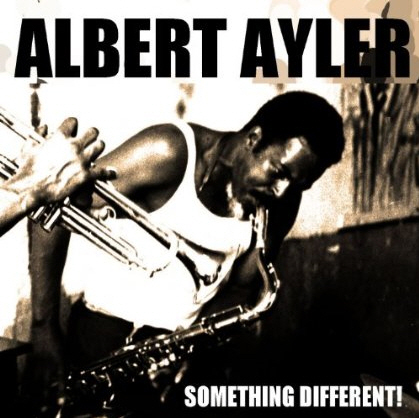 |
|||||||||||||||||||||||
|
From German to Italian As we know, the only book-length biography of Albert Ayler is Spirits Rejoice: Albert Ayler und seine Botschaft by Peter Niklas Wilson, published in Germany in 1996. There has never been an English translation, and there still isn’t. However, last month, an Italian translation was published. |
|||||||||||||||||||||||
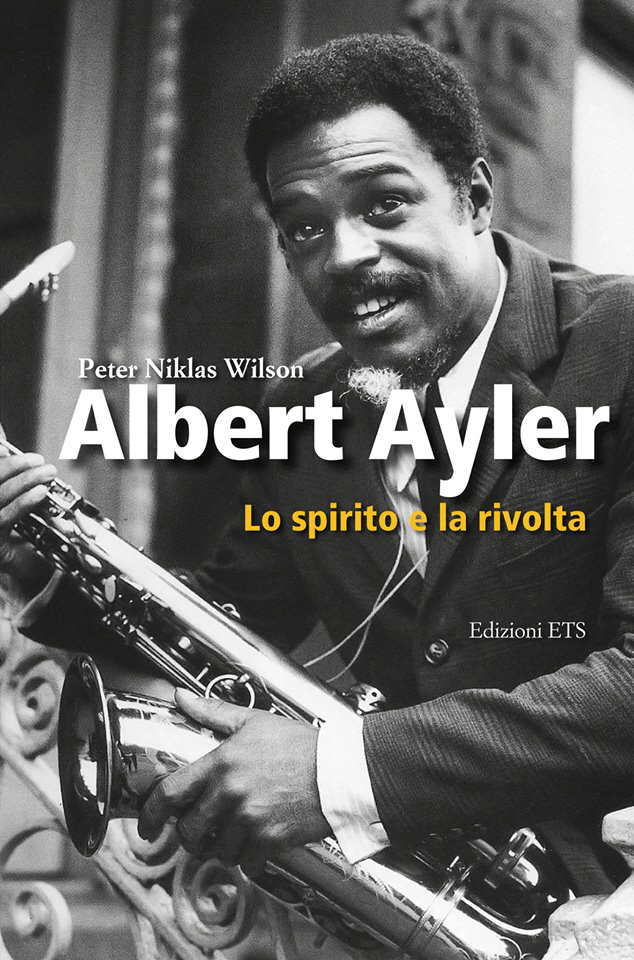 |
|||||||||||||||||||||||
|
Translated by Francesco Martinelli and Antonio Pellicori, Albert Ayler. Lo spirito e la rivolta is published by Edizioni ETS and there are full details and samples on the website. To celebrate the launch of the book, there was an event in Pisa at the Teatro Rossi Aperto on 14th June featuring a concert by Paolo Botti and rare live film footage of Ayler (?). |
|||||||||||||||||||||||
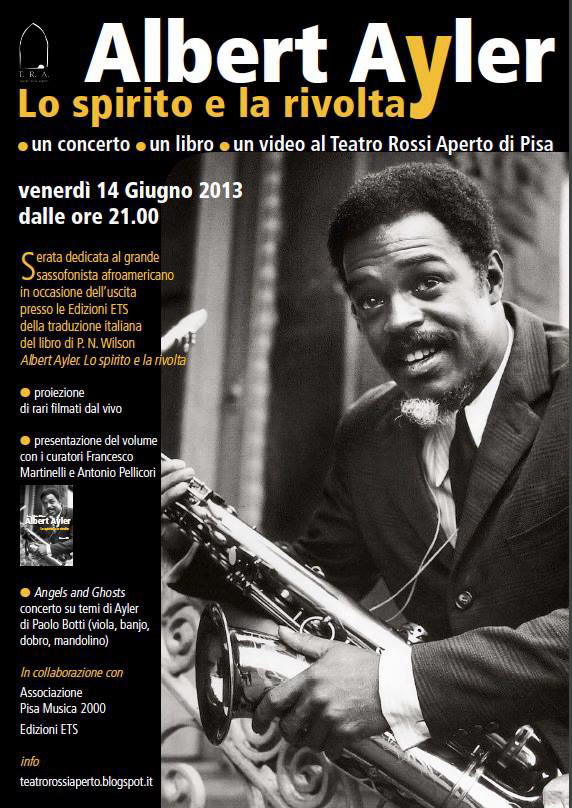 |
|||||||||||||||||||||||
|
Just a couple from Yair Dagan this month: A review of Bells on the iCrates site. And the Ayler-inspired artwork of Nate James on the Forage Press site: “I chose to take on the work of legendary jazz saxophonist Albert Ayler. I sought to conceive Albert as everything that he was - one of the starkest, most ineffable musicians of all time, but also as a great spiritual figure whose process of creation was the very path to liberation for him, and however imperfect, was his only way to contentedness. The specter of death and rebirth hangs over everything he's done (his untimely end certainly contributed to this) and despite this seemingly macabre overhang, his music was founded on liberating whatever energy teemed beneath him. It allows us as listeners to examine some of the most esoteric music of all time, but music that is so honest, fearless and personal that listening to it borders on voyeurism. I didn't want to leave out any piece of the puzzle. The spiritual seeker, fascinating cultural phenomenon, the renegade artist, the fashion icon, the flawed and fractured human being, and the looming presence of a newly liberating death. Equal parts you, me, Basquiat, Coltrane and Yama. |
|||||||||||||||||||||||
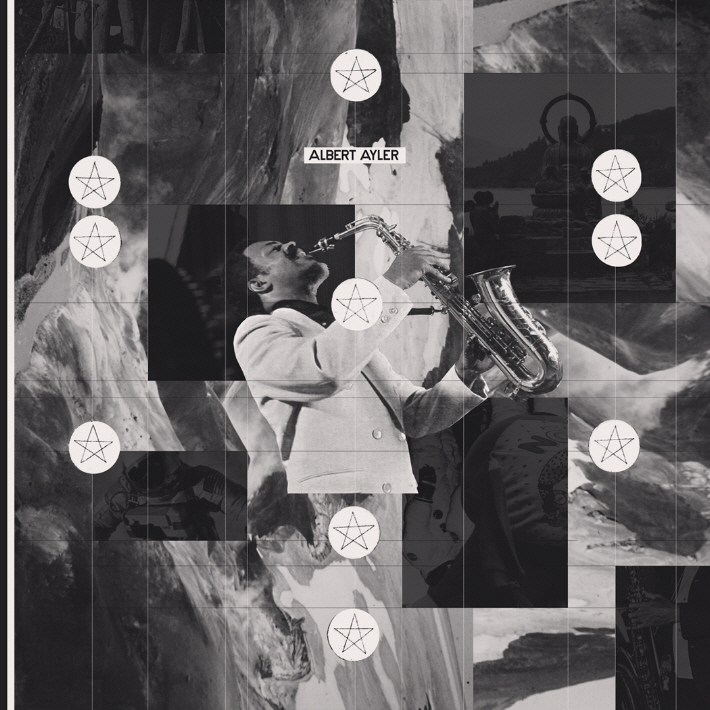 |
|||||||||||||||||||||||
|
More pictures at Forage Press. * And finally . . . What’s New January to June, 2013 has now been archived, but here’s a couple of things you may have missed:
|
|||||||||||||||||||||||
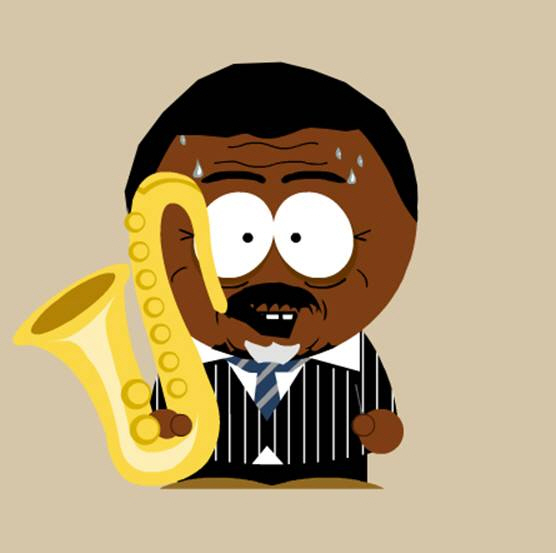 |
|||||||||||||||||||||||
|
August 1 2013 Just a couple of items this month, both courtesy of Yair Dagan. I was hoping to announce a rather major discovery, but I only heard about it last week and at the moment we (me and Pierre Crépon - mainly Pierre) are trying to verify it. If we find out anything before next month then I’ll post the information here immediately. Sorry to be cryptic, but for now things are a bit complicated. * Juma Sultan Not a name, I must admit, I’m acquainted with. Yair found the following article in The New York City Jazz Record of October 2012. Click the picture for a readable version. |
|||||||||||||||||||||||
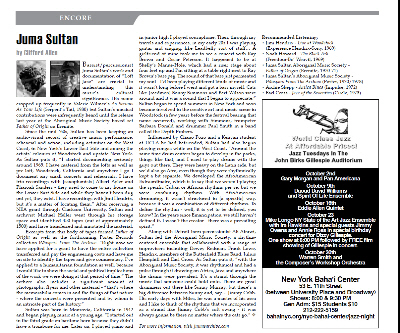 |
|||||||||||||||||||||||
|
Of course, the sentence that immediately leaps out is: “I have trio recordings with [saxophonists] Albert Ayler and Pharoah Sanders - they used to come to my house on the Lower East Side and while they haven’t been dug out yet, they exist.” Part of the archive is online - short samples of Sonny Simmons, Pharoah Sanders and others, but no sign of Ayler. Still, something else to keep an eye on. * Ann Arbor Sun Back in time to the land of the hippies, where a review of The Last Album can end with the statement: “If you’re not hip to Albert Ayler yet you must get his “New Grass” album (the one before “Healing Power”) and go from there.” I blame the drugs. The Ann Arbor Sun archives make for interesting reading - search for Ayler and you’ll find a couple more reviews as well as this ad for the Arista reissue of Witches and Devils from 5th November, 1975. |
|||||||||||||||||||||||
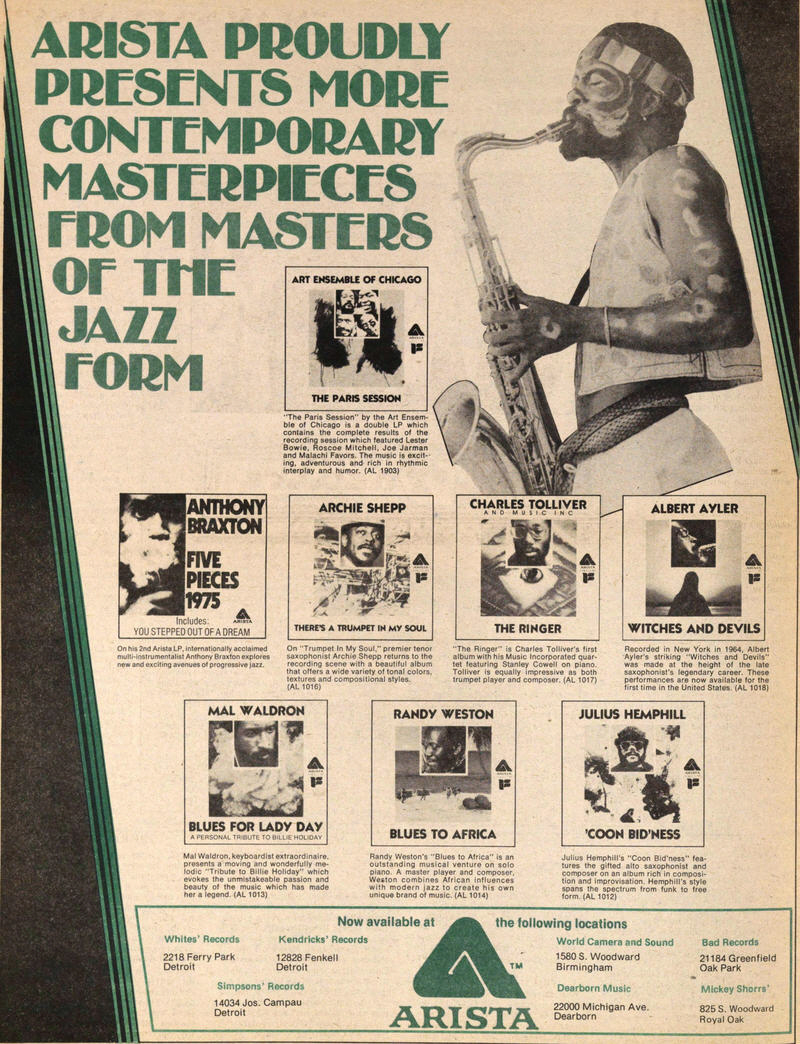 |
|||||||||||||||||||||||
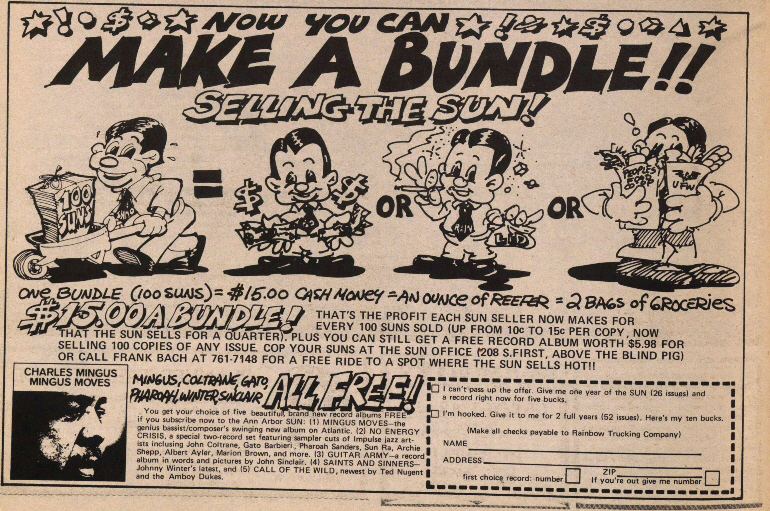 |
|||||||||||||||||||||||
|
September 1 2013 Still no news on the ‘major discovery’ I mentioned last month. Should have kept my mouth shut. Unfortunately France goes on holiday in August, so we’re still waiting for the information. Hopefully we’re not just chasing ghosts (appropriate) and things will be clearer by next month.
Steve Tintweiss and the American Jazz Museum I got an email from Steve Tintweiss which mentioned a recording he’d heard in the American Jazz Museum in Kansas City, Missouri, of an Albert Ayler/Sunny Murray duo. Intrigued, I asked him for more details and he sent the following: “Greetings Albert Ayler Enthusiasts, Apparently the Ayler-Murray duet recording has been on display at The American Jazz Museum for years. When I visited in 2012 it was one of the featured artist/style listening kiosks. I neglected to write down the information that was on the display. The website does not have a comprehensive listing of all details, but it is part of the Permanent Exhibit I believe, as described on their website. They also have an extensive Charlie Parker manuscript library that is not displayed. I would imagine it may be available onsite for jazz researchers and musicologists with pertinent projects. I don't believe it was from a commercially available recording, so it may be unreleased. except to the museum. The 18th and Vine location in Kansas City is an officially recognized historic district. Sunny Murray, do you know about this? The Museum facility actually houses two museums: The American Jazz Museum and the Negro Leagues Baseball Hall of Fame which flourished prior to Jackie Robinson breaking the segregation barrier in Major League Baseball with the National League Brooklyn Dodgers. It is a wonderful place to visit, but may take them awhile before collecting and documenting post bebop/post Parker styles more extensively, hopefully including the avant-garde free form movement. I was pleasantly surprised to find the Albert Ayler kiosk for sure! All Best Wishes, Steve Tintweiss” I have emailed the museum asking for more details, so, again, I wait. * ESP I came across this news item in reference to ESP. Apparently, several employees (including Tom Abbs, one of the driving forces behind the resurgence of the label a few years ago) have left to form their own label, Northern-Spy. After reading this, I checked the ESP site, where there was no mention of it (obviously), but there was this appreciation of The Hilversum Session by pianist, Matthew Shipp: “What an engrossing, well-rounded, colorful sound spectrum. This quartet states, develops and sustains a kaleidoscopic, cohesive and open ended universe. Gary Peacock and Sunny Murray are the perfect bookends for the rhythm section, both solid earth and air leaving beautiful space for Ayler and Cherry to twirl and do their magic. Don Cherry is the perfect complement to Ayler and fits into the continuum like a twin particle in quantum physics. Then there is the resonant and deep sound of Ayler, which sounds both like it emanates out of the center of the earth and also like thunder from heaven. His sound and this music sounds like it has all music behind it. It seems influenced by every folk and jazz tradition there is but it has digested everything so well into the group sound that what you get is a sound continuum. This is deep, graceful music with such a strong core—a four sided cube—it is hard to say why it coheres so well-but don’t worry about the why—the bottom line is it does. At the end of the day it is a beautiful lyrical stream of sound and pulse.” * De Doelen Yair Dagan sent me this advert and a review of the Rotterdam concert from Ayler’s 1966 European tour which he found in the Utrecht Archives. |
|||||||||||||||||||||||
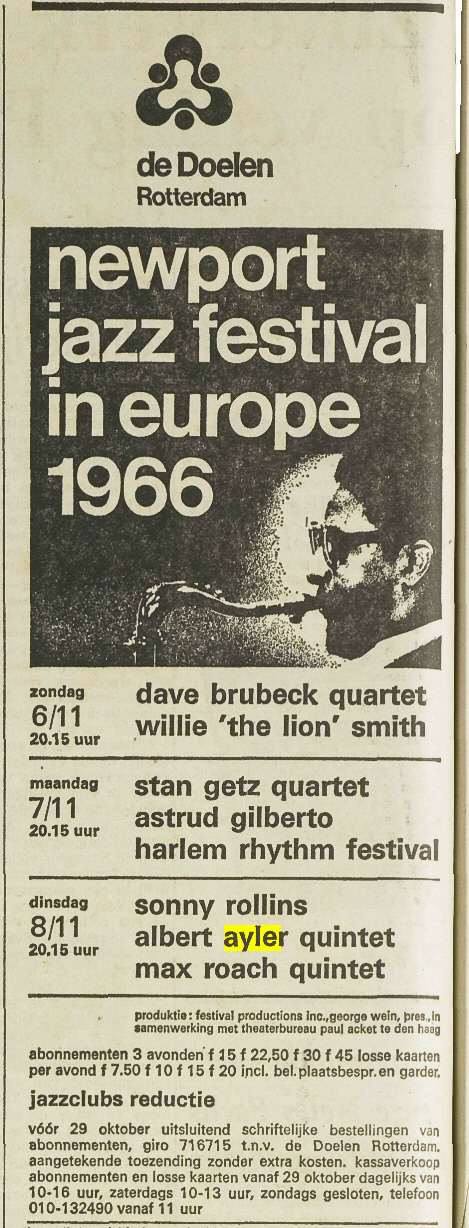 |
|||||||||||||||||||||||
|
From Utrechts Nieuwsblad (21st October, 1966 - p. 6) |
|||||||||||||||||||||||
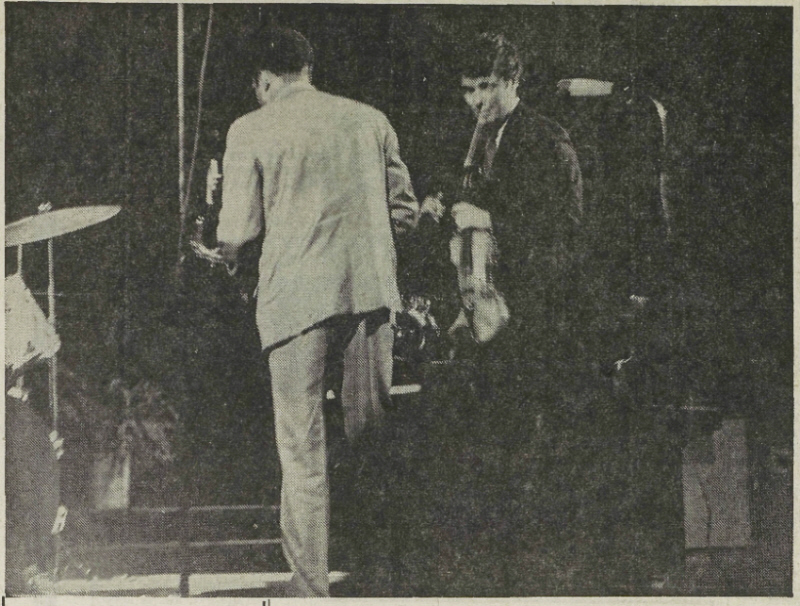 |
|||||||||||||||||||||||
|
From Utrechts Nieuwsblad (9th November, 1966 - p. 5) - click the picture for the full review. * Roscoe Mitchell Yair also came across a couple of interviews, one new, one old (in fact, to avoid needless repetition, let’s just say Yair found the next bunch of items and when you get down to speculations on what Swedish film directors might be up to, you’re back to me). This first one, with Roscoe Mitchell, from earlier this year on the emusic site, contains the following, which may be of interest: “This summer, you’ll be playing in a trio with the legendary bassist Henry Grimes. When did you first hear Grimes — and what role, if any, did it have in your development? Well Henry, I mean he has a lot of knowledge about music. When I was first starting to change the direction of my music, I was listening to him on some of those ESP records. Like The Call? Yeah. So it was great to actually get a chance to play music with him. The first time we played, he was in California doing some concerts, so I had him come in to talk to my improv class…This will be the third performance together. When you talk about the “change” in the direction of your music, I assume this was before Sound and your introduction to the AACM. What else was going on in that period for you? You know, I had heard Ornette Coleman when I was in the Army and so on. And then I had the pleasure of being in the company of Albert Ayler, as he was in [France] then, and I was in Heidelberg, Germany. And we would meet in Berlin and join with the Berlin band — and ah…Then it would be sessions going on. When I met Albert Ayler I didn’t really understand that much of what he was doing. But I did know that, as a saxophonist, he had an enormous sound on the instrument. Once we were playing the blues, and Albert played, you know, the first few chords in a conventional way. And then after that, he began to really stretch the materials. Somehow that made some kind of connection for me…Even then even when I got back to Chicago I wasn’t sold on it totally, at sessions I was still playing in a more conventional way. But then it really wasn’t until I got out of the Army and I started listening to John Coltrane’s record, Coltrane. He was doing, like, “Out of This World.” That was the first “classic quartet” title for Impulse, right? That’s right. And using kind of a modal concept for improvisation. Then, from that point on, is when I started to open up and started really listening.” * Cecil Taylor And here’s Cecil Taylor’s account of his first encounter with Albert, taken from an article on the Jazz Times site, published last year on the occasion of his 83rd birthday: “While I was in Europe, I got to hear music from György Ligeti, Karlheinz Stockhausen, and Pierre Boulez before their music came to America. The third leg of the tour takes place in Copenhagen. Here, Sunny introduced me to the tenor saxophonist Albert Ayler. He tells me, “You should hear me play. I am the best saxophonist you’ve ever heard.” I am not impressed. Albert did not know then that I don’t look for the best saxophonist or the best trumpet player. My standards are different. My musicians play for me. When I see Ayler the next day, he has tears in his eyes. He tells me, “They won‘t let me play.” I said, “You stay right here.” I looked in and this Swedish guy is running the broadcast. He asks me if Ayler is with me and I say, “Yes.” I brought Albert on stage with us. That man could play. When I heard him, he sounded better than John Coltrane. Ayler was technically the most prodigious tenor saxophonist I have ever known. If Adolphe Sax invented the saxophone, no European has ever played like the great black masters of the instrument. After the broadcast in Copenhagen, John Coltrane, who also performed on the TV show with his band, was there and he offered to drive me back to the hotel. He told me that he saw me with Jimmy Lyons and Sunny Murray at Take 3. He told me, “When I heard you at Take 3, I couldn’t believe what I was hearing. I did not know that three men who make so much music.” Then he asked him, “Who was that tenor player up on stage with you?” It was Albert Ayler. He had told me that Sonny Rollins and Eric Dolphy first discovered him. Albert had a brother Donald who played the trumpet. I found out that Donald had a way of playing all the notes condensed into one octave. Man, the brilliance of that funkin’ sound. Well, Sunny took an instant liking to Albert, and he brought Albert on tour with him the following year. Albert played a few shows with me, Jimmy and Sunny at the Five Spot and Take 3 in 1963. Our recording of the track “Four” from the broadcast in Copenhagen is on Albert’s box set (Holy Ghost: Rare and Unissued Recordings (1962 – 1970)." "The last concert I did with Albert Ayler was at the Philharmonic Hall in New York City’s Lincoln Center on New Year’s Eve 1963. You know, what’s interesting about that show is that two white college students produced that event and rented Lincoln Center for the concert. The hall was renamed the Alice Tully Hall in 1973. ... ” * Bird Notes 2 I wish I’d found this one because it is something special. A while back I mentioned Mats Gustafsson’s Discaholic Corner with its page about Ayler’s first LP, Something Different!!!! (later known as The First Recordings). Now he’s got a copy of Something Different!!!! Volume 2, which, although far from being Ayler’s greatest recording, is definitely the rarest. Full details on Discaholic Corner, but here are the covers: |
|||||||||||||||||||||||
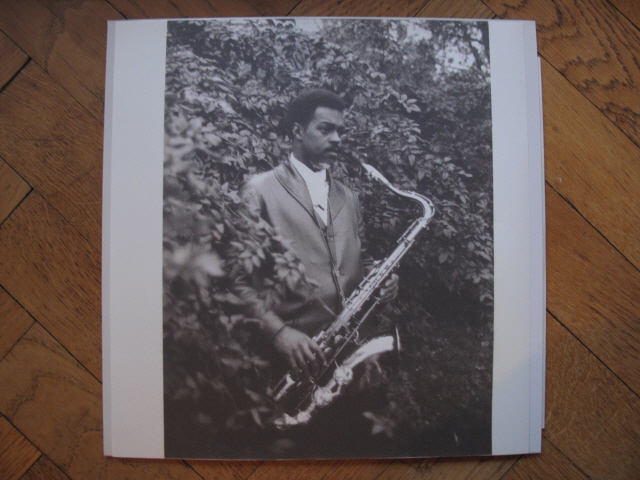 |
|||||||||||||||||||||||
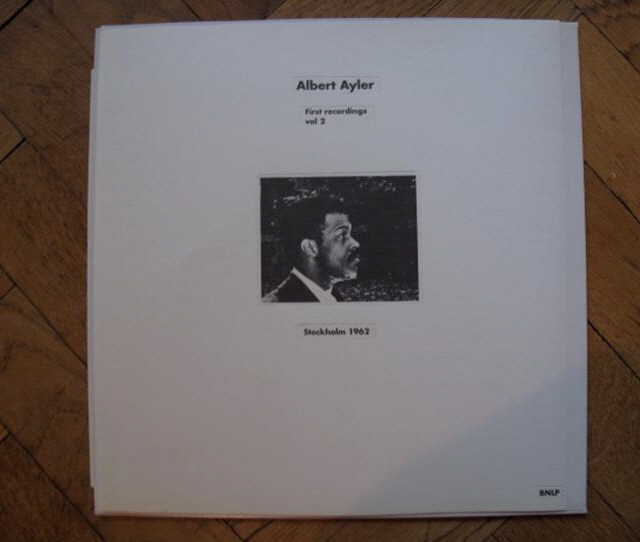 |
|||||||||||||||||||||||
|
The Danger Of Jazz In Art And a short article about late-Ayler pianist, Bobby Few, on the French Citizen Jazz site, led to three videos on youtube of a performance from 2008 of Few’s band accompanied by simultaneous painting by Fabienne Audeoud and Renaud Bezy. Danger Of Jazz In Art 3 - Let it rain * Kasper Collin I was wondering what Kasper Collin (director of yet-to-be-released-on-dvd My Name Is Albert Ayler) was up to these days (thanks Yair) so had a google and it seems he has a new film in the pipeline called American Jazz Musician. Early days yet, but he’s received funding from the Nordisk Film & TV Fond, which describes the film as follows: “American Jazz Musician is a creative documentary about music, love and about America. A snowy night in February 1972, 33 years old, one of the major stars in jazz was shot dead by his girlfriend during a gig at a club in New York City. His sudden death sent thrills through the whole New York jazz community.” And less mysterious is the description on the Ford Foundation site which has also chipped in $50,000: “For ‘American Jazz Musician,’ a documentary on trumpeter Lee Morgan told through the eyes of the common-law wife who killed him.” * And some more stuff from youtube Rent Romus has been flying the flag for Ayler for a while now, and here he is with a tribute to Albert from this year’s In the Flow Festival.
|
|||||||||||||||||||||||
|
Two more tributes: In D & G Still Spring for Albert Ayler Rest Beyond the River (For Albert Ayler) And an interesting version of Our Prayer for guitar, bass and drums. And if you’re sated with music, here’s a man telling you why you should rush out and buy a copy of Spiritual Unity (I’ve got two!) And here’s Rebecca Montgomery’s Albert Ayler presentation for Peripheral Visions Outsider Art History Class (strange what you find on youtube).
|
|||||||||||||||||||||||
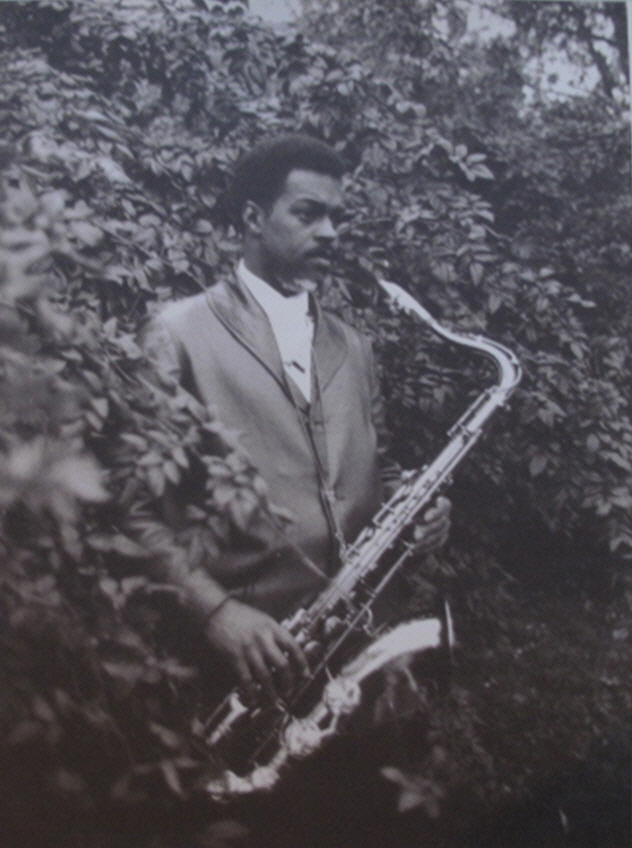 |
|||||||||||||||||||||||
|
*** News from 2004 (January - June) 2004 (July - December) 2005 (January - May) 2005 (June - December) 2010 (January - June) 2010 (July - December) 2011 (January - May) 2011 (June - September) 2011 (October - December) 2012 (January - May) 2012 (June - December) 2013 (January - June) 2013 (October - December) 2014 (January - June) 2014 (July - December) 2015 (January - May) 2015 (June - August) 2015 (September - December) 2016 (January - March) 2016 (April - June) 2016 (July - August) 2016 (September - December) 2017 (January - May) 2017 (June - September) 2017 (October - December) 2018 (January - May) 2018 (June - September) 2018 (October - December) 2019 (January - May) 2019 (June - September) 2019 (October - December) 2020 (January - April) 2020 (May - August) 2020 (September - December) 2021 (January - March) 2021 (April - July) 2021 (August - December) 2022 (January - April) 2022 (May - August) 2022 (September - December) 2023 (January - March) 2023 (April - June) 2023 (July - September) 2023 (October - December) 2024 (January - March) 2024 (April - June) 2024 (July - September) 2024 (October - December)
|
|||||||||||||||||||||||
|
Home Biography Discography The Music Archives Links What’s New Site Search
|
